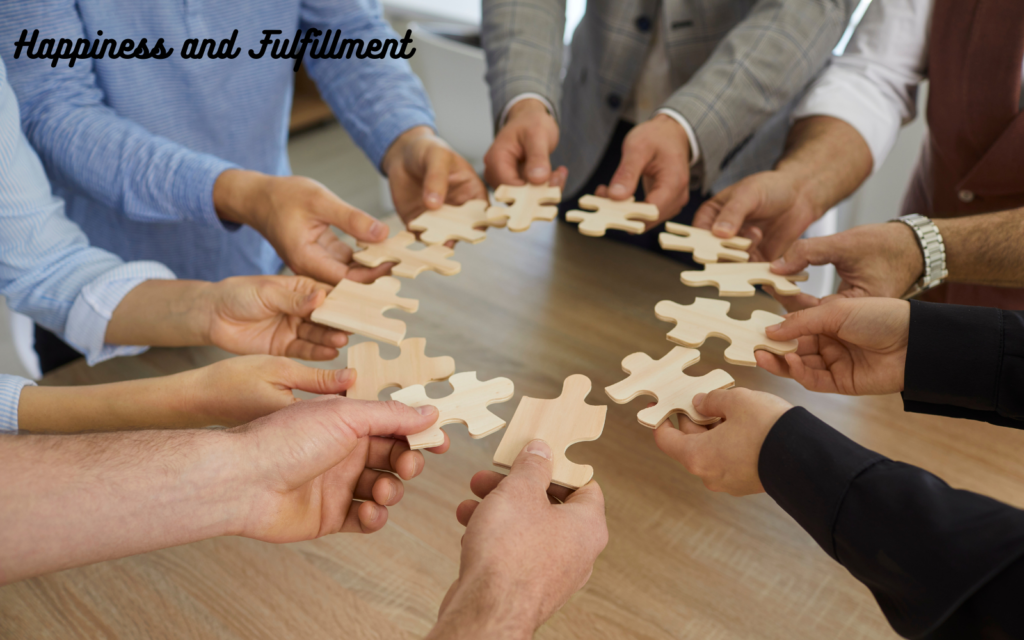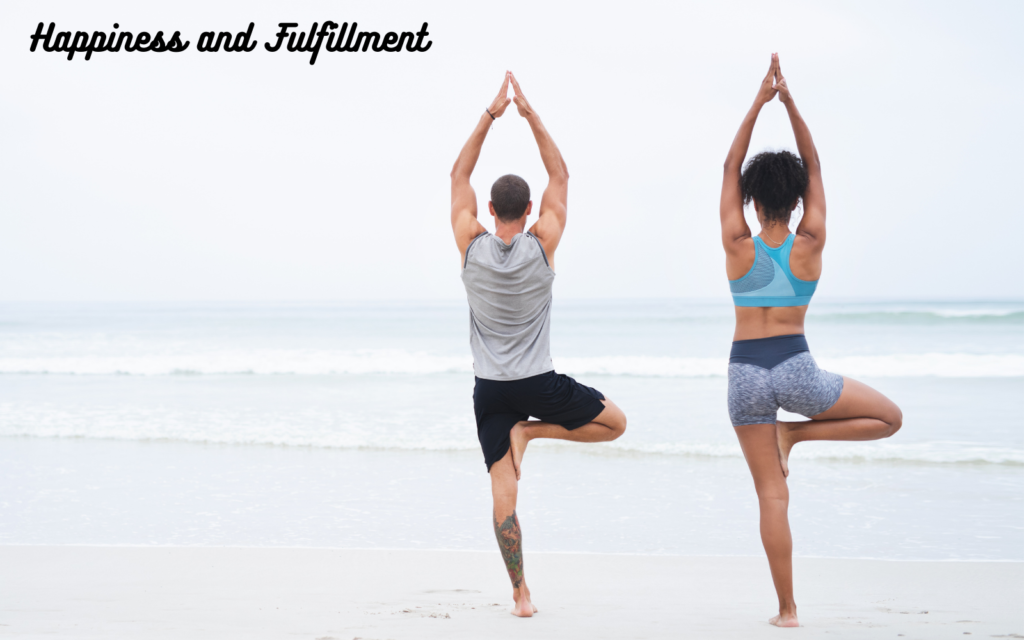Introduction: Happiness and Fulfilment: A Journey, not a Destination

Happiness And Fulfilment:
As we strive for a meaningful existence, happiness and fulfilment often go together. Joy and pleasure are frequently fleeting. However, aligning our values, ambitions, and activities brings fulfilment—a deeper sense of purpose, meaning, and joy.
Your happiness and contentment depend on learning about yourself, evolving, and thinking about what you desire. It includes finding what makes our lives enjoyable and meaningful, creating good habits and relationships, setting meaningful objectives, and contributing to something greater.
Being aware that happiness and fulfilment are journeys, not objectives, helps us appreciate the present, enjoy our experiences, and be open to fresh growth and opportunity. Our lives should be authentic to who we are and make us feel entire and healthy, according to this quotation.
Being aware that happiness and fulfilment are not objectives but routes to be explored allows us to approach life with amazement, strength, and thankfulness, which will enrich and fulfil us.
Table of Contents
Many people assume happiness is fleeting and comes from life’s small joys and triumphs. You could be excited about your desired job, witnessing a loved one smile, or having a peaceful morning coffee. Make these moments our final objective, and we may get locked in a cycle of highs and lows.
Fulfilled people are happier and more pleased for longer. You can get it by living your values, ambitions, and interests. While outside events can affect happiness, personal growth and life journey are more likely to determine fulfillment.
The Journey:
“Happiness and Fulfillment: A Journey, Not a Destination” can change your perspective. Happiness isn’t a checklist item. Instead, we see it as ongoing growth, learning, and flexibility.
This trip is about enjoying the present, learning from mistakes, and accepting life’s ups and downs. It’s about setting meaningful goals and enjoying the small victories. Think on yourself, live in the now, and care for your relationships to be happy.
Exploring Inner Values:
Finding out what matters to you and living by those principles is key to happiness and fulfillment. Thinking about your beliefs helps you see what matters most. Self-reflection reveals your values and beliefs that guide your activities.
Acting in accordance with your ideals gives your life authenticity and character. When your behaviors and choices reflect your values, you feel fulfilled. It can make you happier, more fulfilled, and feel like you’re living a meaningful life.
Living by your values also promotes long-term happiness. By embodying your values, you find inner serenity and well-being rather than fleeting happiness. This alignment guides you toward choices and experiences that match your true self. Over time, this will make life more satisfying and joyful.

Setting Meaningful Goals:
Personal goals that reflect your values are essential to happiness and fulfilment. When your goals match what you care about, they become meaningful steps that make you happy.
Setting goals that reflect your values and priorities creates a fulfilling personal growth and success strategy. These goals show you how far you’ve come on your way to live your authentic life, giving you direction and purpose.
Every step toward your values-based goals helps you feel good and complete. This procedure improves your self-esteem and helps you flourish.
Your values-based goals will also help you stay focused and strong when things go tough. Knowing your efforts are moving you closer to your goals might encourage you. Pursuing your goals can bring you joy and contentment.
Cultivating Positive Habits:
Living a full and meaningful life requires habits that prioritize your health and happiness and make you happier overall. These habits effect your daily life, thoughts, and happiness.
You establish long-term happiness and fulfillment by making healthy physical, social, and mental habits. Exercise, mindfulness, sleep, and healthy nutrition boost your physical health, mood, and outlook.
Learning to think positively, be appreciative, and be kind to yourself will boost your happiness. By practicing thankfulness daily, concentrating on the wonderful things in your life, and being kind to yourself and others, you can develop a more optimistic and resilient mindset that leads to long-term happiness.
Regularly doing things that make you happy, contented, and proud of your accomplishments boosts happiness. Creative things, skills, and spending time with loved ones are healthy for you and make life more fascinating.
Finally, creating routines that prioritize your health and happiness can help you live a life that aligns with your beliefs and aspirations, giving you a sense of contentment that permeates your existence.
Nurturing Relationships:
Making friends and having positive relationships is key to happiness and fulfillment. Your happiness, health, and satisfaction depend on your relationships.
Good connections provide connection, support, and understanding, which can improve mental and emotional health. A supportive network of individuals who make you happy, help you grow, and celebrate your triumphs makes you happier overall.
Happiness, shared experiences, and mental intimacy from meaningful connections can improve your life and make you feel whole. Connecting with people, sharing their joys and sorrows, and receiving support fosters a sense of connectedness and contentment that is healthy.
Poisonous or draining relationships can reduce happiness and fulfillment. Focusing on trust, contentment, and mutual respect creates a safe space to grow and enjoy a fuller life.
Build helpful relationships and stay in touch with individuals you know to improve your happiness and health. By surrounding yourself with people who bring out your best, you may develop a base of love, joy, and support that helps you live a more full and emotionally gratifying life.
Embracing Growth and Learning:
To obtain pleasure and contentment in life, be open to new situations, challenges, and opportunities to grow and improve. Accepting change and leaving your comfort zone can lead to life-changing experiences that extend your perspective, increase your talents, and enrich your life.
Staying open to new work and opportunities allows for self-discovery. Pushing yourself and doing new things teaches you about yourself and the world.
Experiences and challenges that compel you to learn and evolve can reinvigorate your purpose and enthusiasm. Overcoming obstacles, developing new abilities, and adapting to change makes you happier.
Being open to new things might also help you discover hidden talents, hobbies, and interests that enrich your life. Openness to new situations, people, and routes can help you find yourself and be happy.
To realize your greatest potential and live a wonderful, meaningful life, you must retain an open mind and be willing to learn and adapt. Being curious and brave about new things leads to personal growth, happiness, and evolution.
Practicing Gratitude:
Being appreciative can make your life happier and more satisfying. Appreciating the present and recognizing your blessings will help you focus on happiness, wealth, and contentment.
Being grateful is noticing and appreciating the wonderful things in your life, no matter how tiny, and thanking the people, experiences, and opportunities that improve it. Giving thanks trains your mind to notice the positive in life, making you happier and more contented.
Appreciating the present and focusing on what you have can bring you abundance and happiness beyond monetary goods. This perspective change helps you notice the beauty and importance in daily things, making you happier and more contented.
Gratitude also reduces stress, strengthens you, and boosts mood. Studies show that gratitude improves relationships, happiness, and life satisfaction.
Finally, giving thanks daily will make you happier and more content and improve the world for you and others. Valuing the present and the wonderful things in life can bring joy, happiness, and fulfillment.
Contributing to a Greater Good:
Giving to others can bring satisfaction and fulfilment. Kind, generous, and selfless people improve the world and their own lives.
Giving to causes or projects you care about might give you purpose and significance beyond your problems. When you help others and improve the world, you might feel fulfilled beyond personal fulfilment.
Volunteering, providing knowledge, or donating to organizations you care about can help individuals in your neighbourhood and beyond feel like they belong. These ways of giving back help you establish meaningful relationships, care for people, and learn more about the world.
Additionally, helping others increases happiness and well-being. Giving back might make you feel good because you’re helping others and the greater good. Donating, mentoring, or speaking out can help.
When you help others, you leave a positive legacy. Service and giving back provide people a sense of purpose and fulfilment that is vital for a fulfilling life full of joy, appreciation, and happiness.
Embracing the Journey:

Understanding that happiness and contentment are continual processes can change how we live. When we understand that happiness and contentment are part of growing and discovering ourselves, not just when we reach a goal, we open ourselves to many possibilities and ways to improve.
Thinking of happiness and contentment as ongoing processes shows that life is dynamic. Realizing that our wants, values, and ambitions can change relieves the stress of striving for impossible satisfaction. Instead, we value life’s ups and downs, struggles and accomplishments, and ebb and flow as part of our progress.
We may truly enjoy the present moment and the lessons, experiences, and connections that define our lives when we welcome self-discovery and progress. Knowing every step we take is helpful for our health and personal growth makes us curious, flexible, and strong in change and uncertainty.
Understanding that happiness and fulfilment are ongoing encourages us to discover joy and purpose in the little things, celebrate our successes, and keep trying new things. We should fully participate in self-discovery, knowing that any experience, good or terrible, can help us live a more real and satisfying life.
Conclusion:
Finally, finding pleasure and fulfilment is a journey to enjoy, not a goal. “Happiness and fulfilment” describes a fulfilling existence built on self-discovery, personal progress, and a deep connection to what matters.
We can create a joyful, contented, and purposeful life by exploring our core values, setting meaningful goals, making good habits, building supportive relationships, being open to new experiences, practicing gratitude, giving back to the community, and realizing that happiness and fulfilment are ongoing processes.
Learning about ourselves and learning that happiness and contentment are not goals but ever-changing paths of investigation empowers us to live meaningful lives. It encourages us to appreciate the little things in life, be grateful for the wonderful things in life, and cultivate a gratitude and abundance mindset.
Full, honest, and compassionate living brings enjoyment, fulfilment, and a life full of experiences, connections, and personal progress. Enjoy the journey, feel proud of our progress, and find enjoyment in living a life that matches our core beliefs and goals—”happiness and fulfilment”—help us keep on track.
People also ask:
The term “happiness is a journey, not a destination” implies that true happiness comes from appreciating life’s continual events, progress, and experiences rather than seeking a peak happiness. It stresses the significance of enjoying life and finding pleasure in the journey rather than focused on achieving happiness.
Instead than waiting for external events or achievements to create enduring happiness, choosing happiness implies deliberately focusing on positivity, gratitude, and fulfillment in the present. It’s about developing a mindset that values inner serenity and contentment over external things. Happiness is a choice, so people can discover joy and contentment in ordinary events rather than chasing a goal.